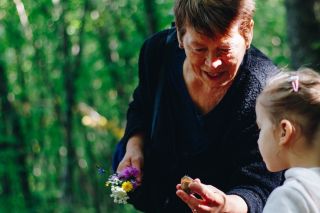Relationships
8 Simple Rules to Help Kids Be Their Most Positive Selves
Personal Perspective: What I tell my grandchildren when they visit Nonna.
Posted August 29, 2023 Reviewed by Kaja Perina
Key points
- It's not always easy to live harmoniously with others, especially for children.
- Adults can teach a child or grandchild attitudes and behaviors that will help smooth family gatherings.
- Living happily with others is a skill that will enhance every dimension of a child's life going forward.

One of my biggest sources of happiness is the time I spend with my kids and grandkids. Perhaps the best times of all are at the cottage, our place at the lake, where my husband and I often have two or more of the four kids in our blended family and their families sharing the place for many days at a time.
As this summer draws to a close and we embark on our last week together for this year, I’m thinking that other families might find our cottage rules helpful at home, the cottage, or anywhere else where different people share space.
These rules come from looking at the research on children’s optimal development and working with families to put that research into practice in all kinds of circumstances and situations. They’re great rules for life, couched in simple terms kids can understand.
1. Be polite.
If someone greets you, return the greeting. If someone asks you a question, respond. (A greeting or a question is a gift. Don’t snub it.)
2. Be kind.
If you just don’t have it in you to be kind, give yourself a time-out until you find your positive equilibrium. A nasty, argumentative, or grumpy person pollutes the environment for everyone else.
3. Leave things better than you find them.
Do your part to keep the cottage clean and tidy, including helping to make meals and clean up afterward and tidying up after a game or activity, whether you’ve made the mess or someone else has.
4. Listen with your heart.
Even when you’re annoyed or irritable, try to listen and respond to others with patience, love, and understanding.
5. Interpret others’ behavior and words in the best possible light.
There’s always more than one way to interpret people’s actions and words. Look for the best way (not the worst).
6. Be a net giver, not a net taker.
Look for ways to give more than you ask for. This shows that you appreciate being here and makes everything go better for everyone, including you.
7. Remember: We have a septic system.
Don’t put anything in the toilet other than the three P's: pee, pooh, and toilet paper. Nothing. If you do, you’ll ensure that Papa has a hard time remembering the rest of these rules.
8. Let me know if you need help following any of these rules.
You know there’s nothing I love more than helping people be their most positive selves.
Rule number seven probably doesn’t apply to your situation. If it does, feel free to use it. Otherwise, maybe you’ve got something else you’d like to make a rule for that I haven’t included here.
Our grandkids range in age from 5 to 12. I didn’t expect so much from them when they were younger, obviously, but starting from their youngest days, I’ve done my best to encourage each person to contribute to the harmonious functioning of the home we create together, day by day. That's partly so I'll enjoy my time together with family and partly because I know it's best for each child as they form relationships with others at home, school, play, and (later) work.
If you want to look at the evidence for these guidelines and how to implement them more fully, see my most recent book, Imperfect Parenting: How to Build a Relationship with Your Child to Weather Any Storm.
And a note on the title: Like so many of my age-peers who were teenagers in the 1960s, my grandkids don’t call me Grandma. They call me Nonna, which is Italian for Grandma. We’re part Italian, and it rhymes with my name, so I like it and it doesn’t make me feel so old.


